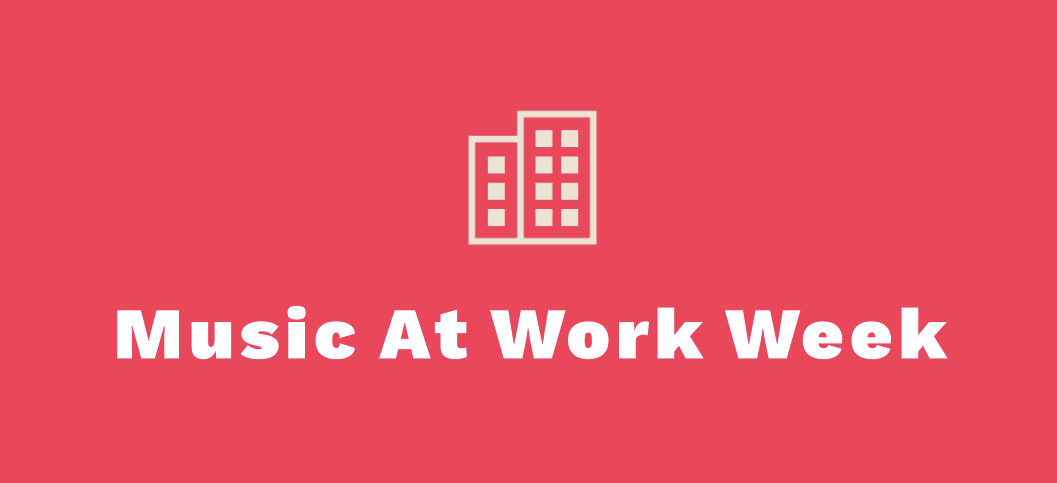The British music industry and the English National Opera have backed the Music at Work Week Campaign- aimed at encouraging employers to enable their staff to listen to music in the workplace to boost wellbeing and productivity.
Michael Dugher, CEO of UK Music, which represents the collective interests of the British music business signed up to the campaign, which is the brainchild of academic and author Dr. Julia Jones, aka Dr. Rock.
Dr. Jones came up with the idea while writing her book The Music Diet, which highlights the power of music in aiding physical and mental health, particularly for those living with dementia. Music At Work Week will take place between November 25-December 1 2019.
Mr. Dugher said: “Music is a key component in human life. This compelling and authoritative book shows a clear link between what we hear and our mental and physical health. Many more of us are likely to succumb to dementia in the future and our musical memories can play a great role in easing its effects. But music can help people of all ages. “The Music At Work Week Campaign is an excellent idea and UK Music and I support the drive to persuade bosses to allow their employees to listen to music in the workplace. This can help stimulate productivity and ease stress in an increasingly complex world of working patterns and environments.
“Dr Rock is setting the pace and leading the debate – she is someone who we all need to listen to.”
And Stuart Murphy, CEO of the English National Opera, also gave his backing and said:
“Music can transform lives and help physical and mental wellbeing for those of all ages. Music At Work Week is a brilliant campaign and employers will see – and hear – the benefits of allowing staff to listen to music of any genre in the workplace. ‘Having opera in the background continually at ENO (and pop and hip hop in the background when I worked at MTV) can have a transformative effect on the happiness of staff. The Music Diet as a must read and totally nails the crucial importance of music in human beings’ lives and for their health.”
Dr. Jones’s studies have identified a clear link between listening to music and easing health problems, particularly dementia. The UK’s first Dementia Village is due to open in Kent in October and Dr. Jones has also curated the music policy there.
Found In Music director Dr. Jones, who has worked with Olympic teams, the NHS, governmental bodies and major brands and corporations around the world, has been prescribing music for personal and business health for over 20 years. She has also been nominated for a prestigious 2019 Great British Entrepreneur Award for her work.
She says: “People need to know that consuming a little music each day, at home and/or at work can improve their life. This isn’t a fantasy, it’s fact. Thanks to scientific research we know music triggers important feel good brain chemicals. When the music is also linked to memories from youth the effects are even greater, especially for those living with dementia.
“My study of neuroscience and music began in the early 1990s and I’ve been prescribing itever since. There has been decades of scientific research identifying the neuro-chemical responses that occur when the brain is presented with music and my book expands on this.
“Humans love music and should listen to more of it. It’s always been this way- the oldest instrument found to date is a 40,000 year old flute! We should all sing, dance and socialise more. And learn an instrument- even the most basic of musical ability can help keep the brain healthy.”
While writing the book, Dr. Jones also came up with the concept of a Music At Work Week Campaign. She is calling on captains of industry and businesses around the world to back the drive, aimed at encouraging employees to listen to music in the workplace to improve health- and productivity.
Work-related stress and anxiety issues cost the economy billions of pounds each year:
- Over 15 million working days are lost in the UK each year due to health problems which are predominantly brought on by workload.
- Work now bleeds outside of the traditional 9to5 working day and for many consumes almost every waking moment via smartphone technology. Employees feel overwhelmed and overloaded and under constant pressure.
- Increasingly, the stress also means workers have sleeping difficulties. Sleep deprivation costs the UK economy £40bn per year due to its effect on focus, productivity and physical/mental health.
- It is almost impossible for many employees to keep up with workload because open plan offices and constant interruptions make it increasingly difficult to focus.
Singer Louise Redknapp, currently starring in musical 9to5, has backed Dr. Jones’s findings in the book and her campaign, saying:
“Music has such power to heal and improve our wellbeing, both physical and mental. Modern working patterns are far from 9to5 and most people are constantly on the go.
“I back the Music At Work Week wholeheartedly. It’s a great idea to allow employees to listen to music in the workplace. Ultimately, it will benefit both the workers and their bosses.”
November 29th 2019 also marks the 39th anniversary of ‘9 to 5’- Dolly Parton’s Grammy award-winning critique of working life, since the subject of a hit Broadway and current West End musical.
The Music Diet book and information about the Music At Work Week campaign can be found at www.musicdiet.co.uk The book is also available through Amazon.
Dr. Jones is available for interview. Please contact Dominic Mohan Media. dominicmohan@dominicmohanmedia.com 07824 428240

Recent Work
- Found in Music’s new Employee Wellbeing service was announced at SXSW in March 2019 and aims to drive workplace transformation to improve the employee experience
- Julia launched an inquiry at the House of Lords chaired by Lord Clement-Jones examining the 360- degree value of music in society from public health to economic development
- Julia wrote the music strategy for the NHS’ first Dementia Village opening in 2019
- She has recently asked PRS for Music and Matt Hancock MP (Secretary of State for Health & Social Care) to explore the possibility of the Dept for Health buying a single annual blanket licence to make it easier for all NHS hospitals, GP surgeries and care homes to use music as standard practice. This new licence is currently being priced up
- Julia sits on the Education Task Force for the All Party Parliamentary Group for AI, championing the importance of creativity (a futureproof skill where humans excel) in education curriculums
- She presented her music and health work at the United Nations’ World Urban Forum in Kuala Lumpur in 2018 and at Music Cities Convention in Chengdu in 2019
- Julia’s first music and health book titled ‘The Music Diet’ will be available in 2019 and shows how to embed music into daily lifestyles and workplaces to reap health benefits Qualification, Positions & Publications
- Julia has a BA (Hons) and MSc in Sport & Exercise Sciences, an MBA, a PhD and a range of coaching qualifications. Her work has been published in the Journal of Sport & Exercise Sciences, in trade and consumer publications and featured on TV and radio
- She is a Trustee of Young Voices Concerts (the largest schools’ choir in the world), was former Entrepreneur-in-Residence for Creative Industries at Canterbury Christ Church University and now sits on a number of Boards and Committees including the London Music Board (Greater London Authority), Musical Walkabout (a music and dementia CIC) and the BBC Music Day Steering Committee.











